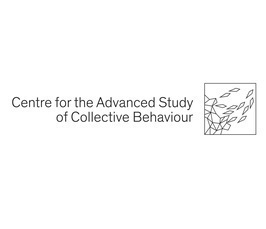CASCB talk: Communicative and cognitive mechanisms underlying multi-level dolphin alliances by Stephanie King
- Date: May 19, 2022
- Time: 11:45 AM - 12:45 PM (Local Time Germany)
- Speaker: Dr Stephanie King
- Dr Stephanie King, School of Biological Sciences, University of Bristol
- Location: M0628 and online
- Room: M0628
- Host: Centre for the Advanced Study of Collective Behaviour

- Meeting-ID: 938 4173 6000
- Kenncode: 993315
Almost four decades of research on Indo-Pacific bottlenose dolphins in Shark Bay, Western Australia, has revealed a complex structure of nested alliance formation. Unrelated male dolphins form three levels, or ‘orders’, of alliances in competition over females; both within groups, i.e., first- and second-order alliances, and between groups, i.e., third-order alliances that are based on cooperation between two or more second-order alliances against other groups. These nested alliance levels require dolphins to keep track of many differentiated relationships, both at the individual and alliance level, which may pose significant cognitive challenges. I will cover some of the key research on the communicative and cognitive mechanisms underlying these long-term alliances, as well as the lifetime fitness benefits of such cooperation. I will use extensive field data to show that acoustic and behavioural coordination are key components of dolphin alliance behaviour, that males use multiple mechanisms to service their vital social bonds, and that alliances between groups (third-order alliances) increase access to a contested resource. I will also use playback experiments to illustrate that allied male dolphins form social concepts that categorize core allies according to shared cooperative history. Taken together, this work demonstrates that bottlenose dolphins are a valuable model system for understanding the evolution of polyadic cooperation between non-kin.
Stephanie King is a Senior Lecturer in the School of Biological Sciences at the University of Bristol, where she heads the cetacean communication and cognition lab. She completed her BSc at the University of Leeds, before receiving her Masters and PhD from the University of Andrews. In 2015, she was awarded a five-year Branco Weiss Fellowship and started dolphin communication research in Shark Bay, Western Australia. This long-term research project was established in 1982 by a team of international researchers to study the behavioural ecology of the dolphin population, providing nearly 40 years of behavioural and demographic data. She now leads the Shark Bay Dolphin Research with her collaborators, where her work focuses on the interplay between vocal communication and cooperative strategies in multi-level dolphin alliances.